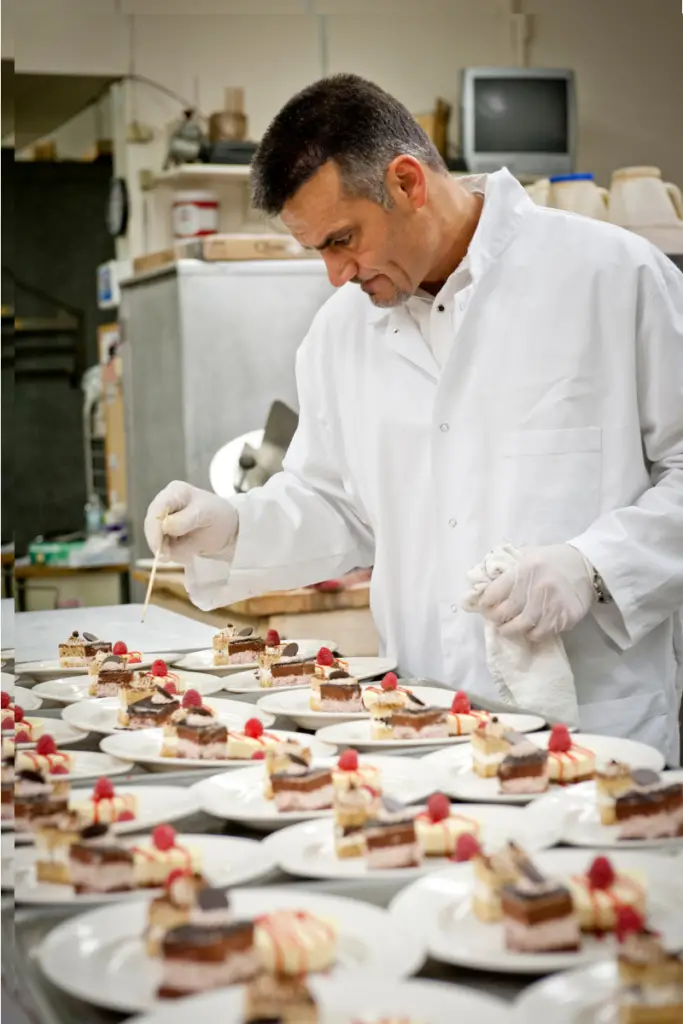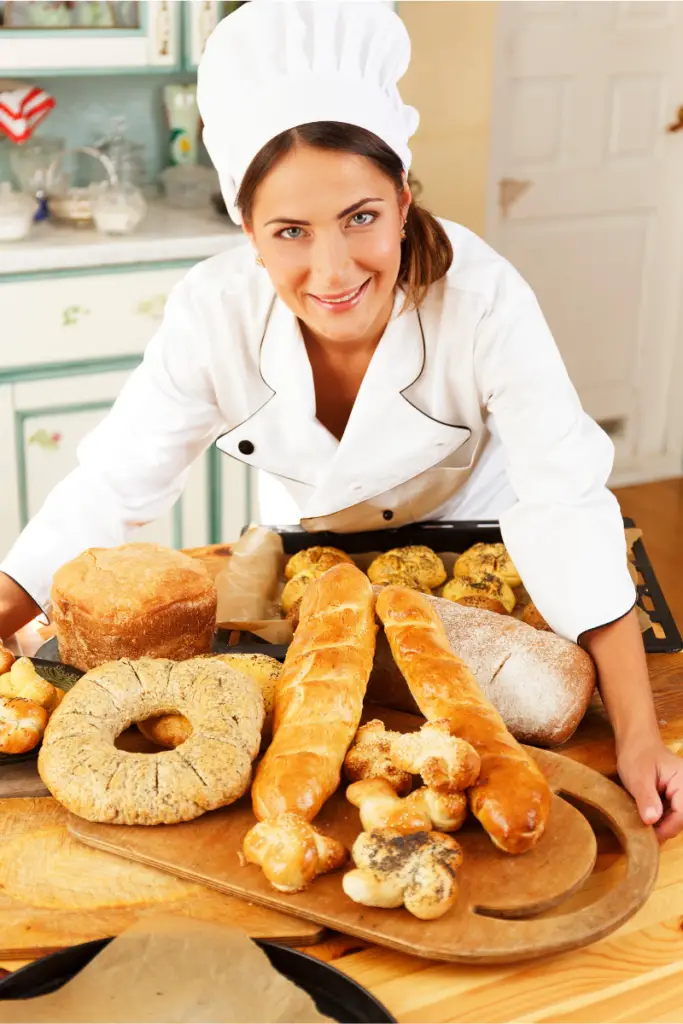Pastry chefs are culinary artists who specialise in creating delectable, sweet treats that delight the senses. They are the maestros of the dessert world, skillfully combining flavours, textures, and aesthetics to craft culinary masterpieces.
As part of his culinary training, our son is completing training in baking and pastry. Knowing so little about it as parents, we researched to gain a better understanding and share this to assist you if this is a career path you are interested in.
Delving into the role of pastry chefs, in this comprehensive article, we explore their roles, responsibilities, work environment, required qualities, career progression, and more. If you aspire to be a pastry chef, this guide will provide valuable insights into this captivating profession.
Table of Contents:
- Description Of a Pastry Chef.
- Duties and Responsibilities of a Pastry Chef.
- The Nature and Dynamics of a Pastry Chef’s Work Environment.
- How to Become a Pastry Chef: Training and Qualities Needed.
- Qualities Needed to be an Excellent Pastry Chef.
- Job and Career Opportunities for Pastry Chefs.
- Career Progression for a Pastry Chef.
Description of a Pastry Chef.
What is a Pastry Chef?
A pastry chef is a culinary expert in creating various pastries, desserts, cakes, bread, and confections. They bring sweetness and artistry to the culinary world and combine knowledge of baking techniques, flavour profiles, and design principles to craft visually stunning and delicious creations.
Types of Pastry Chefs:
Within the realm of pastry chefs, several specialised roles exist. These include:
Confectioner:
Masters of confectionery, specialising in creating candies, chocolates, and other sweet confections.
Glacier:
Experts in crafting frozen desserts, such as ice creams, sorbets, and gelatos, with a focus on flavour profiles and textures that excel in a cold and creamy state.
Boulanger:
Specialists in bread-making, focusing on creating various types of bread, from rustic artisan loaves to delicate pastries like croissants and brioche.
Decorator:
Skilled in cake decoration, using icing, fondant, and sugarcraft to create visually stunning cakes and pastries.
Duties and Responsibilities of a Pastry Chef.
Pastry chefs have a range of duties, roles and responsibilities to ensure the successful creation and execution of their sweet designs. These may include:
Recipe Development and Menu Planning:
- Create and develop innovative pastry recipes, considering flavour profiles, dietary restrictions, and seasonal ingredients, to offer a diverse and enticing menu selection.
- Collaborate with the culinary team to integrate pastry offerings seamlessly into the overall menu, ensuring consistency and complementarity.
Pastry Production and Preparation:
- Oversee the production and preparation of various pastries, desserts, bread, and confections, ensuring adherence to established recipes, quality standards, and presentation guidelines.
- Monitor inventory of ingredients, anticipate production needs, and manage production schedules to meet customer demand.
Ingredient Selection and Procurement:
- Source and select high-quality ingredients, such as flour, chocolates, fruits, and dairy products, to ensure the best flavours and textures in the final products.
- Establish relationships with suppliers, negotiate pricing, and manage inventory to maintain a consistent supply of fresh ingredients.
Pastry Techniques and Execution:
- Apply various pastry techniques, such as baking, cake decorating, chocolate work, and sugar pulling, to create visually appealing and delicious pastries.
- Demonstrate precision and attention to detail in executing intricate pastry designs, ensuring portioning, shaping, and finishing consistency.
Quality Control and Hygiene Standards:
- Uphold strict quality control measures to ensure that all pastries meet the highest taste, texture, and presentation standards.
- Maintain a clean and organised pastry kitchen, following food safety and hygiene regulations to ensure a safe and sanitary working environment.
Staff Training and Supervision:
- Train and mentor pastry team members, providing guidance on pastry techniques, recipe execution, and presentation to enhance their skills and foster a cohesive working environment.
- Delegate tasks and monitor the performance of pastry staff, ensuring efficient workflow, adherence to standards, and timely completion of assignments.
Menu Adaptation and Special Requests:
- Accommodate special dietary requirements, allergies, and customer preferences by adapting recipes and creating alternative versions of pastries, such as gluten-free or vegan options.
- Respond to customer requests for customised desserts, collaborating with the front-of-house staff to create memorable dining experiences.
Pastry Presentation and Garnishing:
- Ensure that all pastries are artfully presented, garnished, and finished precisely, considering colour palettes, textures, and balance on the plate.
- Stay updated on current trends in pastry presentation, incorporating creative plating techniques and decorations to enhance the visual appeal of desserts.
Cost Control and Budget Management:
- Optimise ingredient usage and minimise waste to control costs and maintain profitability without compromising the quality and taste of pastries.
- Collaborate with the management team to develop budgets, monitor expenses, and analyse financial reports related to the pastry department.
Collaboration and Communication:
- Work closely with the culinary team, including chefs, cooks, and servers, to coordinate timing and ensure a seamless flow of pastry orders within the overall kitchen operations.
- Communicate effectively with other departments, such as event planning or banquet teams, to coordinate pastry production for special events and functions.
Pastry Innovation and Trends:
- Stay informed about current pastry trends, techniques, and flavours by attending industry events, researching new recipes, and experimenting with innovative ingredients and methods.
- Continuously explore new concepts, flavours, and pastry combinations to contribute to the establishment’s culinary reputation and ongoing success.
Guest Interaction and Customer Service:
- Interact with guests, provide recommendations, and answer inquiries about pastry offerings, demonstrating product knowledge, passion, and exceptional customer service.
- Solicit guest feedback, evaluate customer satisfaction, and use feedback to make necessary adjustments to the pastry menu and overall guest experience.
Maintenance and Equipment Management:
- Maintain and oversee the operation of pastry equipment, such as ovens, mixers, and pastry tools, ensuring they are in proper working condition and promptly arranging repairs when necessary.
- Manage the pastry kitchen’s maintenance schedule, cleanliness, and organisation, including storage areas and workstations, to optimise workflow and efficiency.
Menu Costing and Pricing:
- Conduct cost analysis for pastry menu items, including ingredient costs, labour expenses, and overhead, to establish appropriate pricing that ensures profitability while remaining competitive in the market.
- Regularly review and adjust menu prices based on ingredient price fluctuations, market trends, and financial goals of the establishment.
The Nature and Dynamics of a Pastry Chef’s Work Environment.
The work environment of a pastry chef is fast-paced, demanding, and creative. Key characteristics include:
High-Pressure Environment:
Pastry kitchens can be intense, especially during peak hours or in preparation for special events. Pastry chefs must be able to handle the pressure and meet deadlines.

peak hours or special events.
Attention to Detail:
Precision and meticulous attention to detail is essential, as even the smallest measurement or decorating flaw can affect the final product.
Collaboration and Communication:
Pastry chefs often work as part of a team, collaborating with other chefs, sous chefs, and kitchen staff. Effective communication is crucial for smooth operations.
Creativity and Innovation:
Pastry chefs are encouraged to explore new flavours, techniques, and designs, bringing innovation and creativity to their sweet creations.
Flexible Work Hours:
Pastry chefs often work early mornings, late evenings, weekends, and holidays, as desserts are in high demand during special occasions and peak dining hours.
A Day in the Life of a Pastry Chef:
Below is a short video on what it’s like being a pastry chef:
How to Become a Pastry Chef: Training and Qualities Needed.
There are multiple paths to becoming a pastry chef, including formal culinary education and hands-on experience. Here’s a step-by-step guide:
Fulfil School-Level Requirements:
Obtain a high school diploma or equivalent: Most culinary programs, including pastry arts, require a high school diploma or a General Education Development (GED) certificate as a minimum educational requirement.
Build a strong foundation in core subjects: Subjects like mathematics, English, and chemistry can provide valuable skills and knowledge relevant to a pastry arts career.
Seek Formal Education and Training:
Consider enrolling in a reputable culinary school or institute offering specialised programs in pastry arts. These programs provide a strong foundation in baking techniques, flavour development, and kitchen management.
Alternatively, Seek Apprenticeships and Internships:
Seek apprenticeship opportunities under established pastry chefs or within renowned pastry kitchens. Hands-on experience in a professional setting allows for practical training and exposure to various techniques.
Supplement with Additional Self-Study and Practice:
Supplement formal training or work experience by self-studying pastry techniques, experimenting with recipes at home, and seeking inspiration from books, online resources, and culinary shows.
Gain Experience and Build Skills.
Start working in entry-level positions, such as a pastry assistant, to gain practical experience in a professional kitchen. This provides an opportunity to learn from experienced pastry chefs while honing skills on the job.
Start from the basics: Begin your culinary career by working in entry-level positions in a bakery, pastry shop, or restaurant. This allows you to gain practical experience and develop a strong foundation in pastry techniques and operations.
Learn from experienced chefs: Seek opportunities to work under professional pastry chefs who can mentor and guide you in honing your skills and learning advanced techniques.
Explore diverse settings: Work in different establishments to gain exposure to various styles of pastry-making, such as restaurants, hotels, bakeries, patisseries, or speciality dessert shops.
Specialise and Refine Your Craft:
Identify your areas of interest: Determine your preferred pastry specialisation, such as cake decorating, chocolate work, bread-making, or confectionery, and focus on developing expertise in those areas.
Develop a Portfolio:
Document your creations: Maintain a portfolio showcasing your pastry creations, including photographs and descriptions of your work. This helps demonstrate your skills and creativity to potential employers or clients.
Participate in competitions: Competing in pastry competitions allows you to showcase your talent, receive valuable feedback, and gain recognition in the industry.
Networking and Mentorship:
Connect with pastry chefs in the industry, attend culinary events, and join professional organisations to build relationships and seek mentorship opportunities. Valuable guidance and advice can come from experienced professionals.
Pursue Continuous Professional Development:
Attend industry events: Participate in culinary conferences, workshops, and trade shows to connect with industry professionals, learn about the latest trends, and expand your network.
Join professional organisations: Become a member of culinary associations or pastry-focused organisations that offer resources, networking opportunities, and educational programs for pastry chefs.
Continual learning: Embrace a lifelong learning mindset and consistently seek opportunities to expand your knowledge, refine your skills, and experiment with new ingredients, techniques, and flavours.
Stay updated: Keep up with industry publications, blogs, and online platforms to stay informed about emerging techniques, flavours, and trends in the pastry world.
Pursue Professional Certifications: Consider pursuing professional certifications in pastry arts, which can enhance credibility and demonstrate expertise to potential employers.
Pursue Career Opportunities:
Look for job openings: Search for pastry chef positions in establishments that align with your career goals, such as high-end restaurants, hotels, bakeries, or speciality dessert shops.
Start your own business: Consider entrepreneurship by starting your own bakery, pastry shop, or catering business. This allows you to have creative freedom and express your unique culinary vision.
Qualities Needed to be an Excellent Pastry Chef.
Becoming a successful pastry chef requires a unique combination of personal and professional qualities. Some essential attributes include:
Passion for Pastry:
A genuine love and passion for the art of pastry, a curiosity for flavours, and a desire to continually learn and experiment.
Creativity and Artistic Flair:
Pastry chefs must envision and create visually stunning desserts that showcase artistic talent and attention to detail.
They must be willing to push boundaries and think outside the box, introducing unique flavours, designs, and techniques to captivate customers.

Attention to Detail:
The smallest details can elevate a dessert from good to exceptional. Paying meticulous attention to every element, from flavour balance to plating aesthetics, is crucial.
Meticulous attention to detail is also essential for achieving precision in measurements, consistency in baking results, completing intricate decorations, maintaining high presentation standards and ensuring every pastry is visually appealing.
Patience and Perseverance:
Pastry chefs encounter complex techniques and intricate processes that require patience and perseverance to master. Patience is key in executing precise baking techniques and intricate decorating.
Pastry chefs must be willing to dedicate time and effort to achieve excellence, especially when working with delicate pastries and decorations.
Problem-Solving:
Pastry chefs must be deft at troubleshooting and finding solutions to unexpected challenges that may arise during baking and pastry preparation, such as ingredient shortages or equipment malfunctions.
Adaptability and Resilience:
Adapting to changing trends, dietary restrictions, and customer preferences while maintaining the core principles of pastry craftsmanship is crucial.
The culinary industry is dynamic, and pastry chefs must adapt to changing circumstances, work under pressure, and handle unexpected challenges is vital.
They must also be adaptable to adjusting recipes, techniques, or designs based on ingredient availability, customer requests, or unforeseen circumstances is essential.
Pastry chefs need resilience in the face of setbacks or demanding situations and the ability to maintain composure and focus on delivering high-quality pastries.
Time Management:
Efficient time management skills to handle multiple tasks simultaneously, ensuring timely delivery of desserts while maintaining quality and consistency.
Teamwork and Collaboration:
The ability to work well within a team, communicate effectively, and collaborate with colleagues to achieve common goals.

Hygiene and Safety Consciousness:
A strong understanding of food safety protocols and impeccable hygiene standards to ensure customer’s and staff’s health and safety.
A Strong Work Ethic:
Pastry chefs often work long hours, with early mornings and late nights. An excellent pastry chef is dedicated, hardworking, and committed to their craft.
Discipline and Organisation:
Pastry chefs must maintain high discipline and organisation to manage multiple tasks, meet deadlines, and ensure smooth kitchen operations.
Strong organisational skills in ingredient inventory, production schedules, and maintaining cleanliness and order in the pastry section.
Physical Stamina, Endurance and Manual Dexterity.
The pastry kitchen can be physically demanding, requiring long hours on your feet and the ability to work in a fast-paced environment.
Good physical stamina and endurance are necessary to withstand the physical exertion of repetitive tasks and heavy lifting.
Possessing excellent hand-eye coordination and manual dexterity to handle delicate pastry work, intricate decorations, and precise techniques is necessary. Fine motor skills are crucial for piping, shaping dough, tempering chocolate, and creating intricate designs.
Job and Career Opportunities for Pastry Chefs.
Below is information on where pastry chefs can work, the specialist jobs available for them and non-traditional careers that pastry chefs can pursue.
Where Pastry Chefs Can Work.
Pastry chefs can find employment in a variety of settings, including:
Restaurants and Cafes:
Many restaurants and cafes have dedicated pastry sections where chefs create desserts and pastries for their menu offerings.
Hotels and Resorts:
Large-scale establishments often have pastry departments responsible for creating desserts, wedding cakes, and speciality items for banquets and events.
Bakeries and Patisseries:
Pastry chefs can work in small-scale bakeries or patisseries, specialising in producing bread, pastries, cakes, and other baked goods.
Pastry Shops and Boutiques:
Artisanal pastry shops and boutique establishments focus on high-end and visually stunning pastries, cakes, and confections.
Catering Companies:
Pastry chefs may work in catering companies, preparing desserts and pastries for corporate events, weddings, and other special occasions.
Food Production Companies:
Large-scale food production companies often have pastry divisions responsible for creating pre-packaged pastries and desserts for retail sales.
Cruise Ships and Airlines:
Pastry chefs can find opportunities to work aboard cruise ships or with airlines, creating desserts and pastries for onboard dining and in-flight meals.
Specialist Pastry Chef Careers and Places to Work.
The examples of specialised pastry careers below allow pastry chefs to focus on specific areas of expertise within the pastry arts, showcasing their skills and creativity in unique and technical roles.
Cake Designer and Artist:
Key role: Create intricate and visually stunning custom cake designs for special occasions and events, including weddings, birthdays, and celebrations.
Where to work: Event planning companies, high-end bakeries specialising in custom cakes, cake design studios, luxury hotels, and wedding planning companies.

Artisan Bread Baker:
Key role: Master the craft of breadmaking, specialising in creating artisanal bread with unique flavours and textures.
Places to work: Artisan bakeries, speciality bread shops, farm-to-table restaurants, bread-focused cafes. You can click the link for detailed information on a career as an artisan bread maker.

Sugar Artist:
Key role: Sculpt and create elaborate sugar showpieces, delicate sugar flowers, and intricate sugar decorations.
Places to work: High-end hotels, luxury resorts, high-profile events and banquet companies, culinary arts schools. You can click the link for more information on pursuing a career as a sugar artist.
Chocolatier:
Key role: Craft exquisite chocolates and confections, specialising in chocolate-making and flavour combinations.
Where to work: Chocolateries, artisan chocolate shops, boutique chocolate companies.

Chocolate Sculptor:
Key role: Use chocolate as a medium to create stunning edible sculptures and centrepieces.
Places to work: Chocolate shops, luxury hotels, fine dining establishments, and event planning companies.
Frozen Dessert Specialist:
Key role: Focus on creating and innovating frozen desserts, such as ice creams, sorbets, and gelatos.
Places to work: Ice cream shops, artisanal dessert cafes, speciality dessert establishments, upscale restaurants.
Gluten-Free/Paleo Pastry Chef:
Key role: Specialise in creating pastries and desserts for individuals with specific dietary needs, focusing on gluten-free or paleo-friendly options.
Places to work: Health-focused bakeries, speciality dietary food companies, wellness retreats, alternative diet-focused restaurants.
Pastry Sommelier:
Key role: Pair desserts and pastries with complementary beverages, such as wines, spirits, coffees, and teas, to enhance the overall dining experience.
Places to work: Fine dining establishments, upscale restaurants, wine bars, a speciality dessert and wine pairing events.
Vegan Pastry Chef:
Key role: Specialise in creating plant-based pastries and desserts, catering to the growing demand for vegan options.
Places to work: Vegan bakeries, plant-based restaurants, health food stores, vegan and vegetarian cafes.
Alternative Pastry Chef Careers.
Pastry chefs can also explore their creativity, specialise in specific areas, and take on unique opportunities beyond the traditional career path, showcasing their culinary skills and expertise in various ways. Here are some examples:
Pastry Instructor.
Key Role: Pastry chef instructors share their knowledge and passion for pastry arts by teaching aspiring chefs in culinary schools, workshops, or private classes.
Where to work: Culinary schools, community colleges, vocational training centres, private cooking schools.
Food Stylist:
Key role: A Pastry chef working as a food stylist can use their artistic skills to create visually stunning food presentations for photography, film, or culinary publications.
Where to work: Advertising agencies, media production companies, culinary publications, and food photography studios.

Recipe Developer:
Key role: A pastry chef recipe developer creates and tests new recipes for cookbooks, food magazines, or culinary websites, showcasing your creativity and culinary expertise.
Where to work: Cookbook publishers, food magazines, culinary websites, and test kitchens.
Pastry Researcher/Developer:
Key role: Explore and experiment with new ingredients, techniques, and flavour combinations to innovate in pastry arts and develop new pastry products for the retail market.
Places to work: Culinary research institutions, food and beverage companies, large-scale bakeries, and product development departments.
Private Pastry Chef.
Key role: Offer personalised pastry services to high-profile clients, creating customised desserts and pastries for their preferences and occasions.
Where to work: High-profile households, celebrity chefs, private catering companies, luxury resorts.
Food Blogger/Influencer.
Key role: Sharing your culinary creations, recipes, and tips through a blog or social media platform, building an online following and establishing your brand.
Where to work: Personal blog or website, social media platforms (Instagram, YouTube), collaborations with brands and food companies.
Pastry/Culinary Consultant:
Key role: Consults and provides expert advice and guidance on pastry-related matters, including menu development, pastry techniques, quality control, and kitchen operations.
Places to work: Restaurants, hotels, catering companies, culinary schools, food service consulting firms and culinary businesses seeking professional advice and guidance.
Pastry Entrepreneur/Bakery Owner.
Key role: Starting your own bakery, pastry shop, or dessert-focused business showcasing your unique creations and managing all aspects of the company.
Places to work: Self-owned bakery, pastry shop, or patisserie in a standalone location or within a food market or shared commercial kitchen space.
Career Progression for a Pastry Chef.
After completing pastry school training, there are several career progression opportunities for pastry chefs. These can vary depending on factors such as talent, ambition, dedication, and the path one chooses within the pastry arts.
Career progression and salary growth may vary and depend on the path one chooses, establishment types and location, performance, individual talent, qualification experience, work ethic, additional responsibilities and opportunities available.
For more information on the type of salaries that can be earned in the pastry industry, please consult our article dedicated to this topic.
Overall, the career progression for pastry chefs after pastry school training involves gaining experience, building a professional reputation, specialising in specific areas, and advancing to leadership roles or entrepreneurship.
Here are descriptions of these career progression paths:
Start In an Entry-Level Position to Build Experience.
After completing pastry school, most pastry chefs start their careers in entry-level positions to gain practical experience. These positions can include:
- Pastry Cook: Assisting in preparing pastries and desserts under the guidance of more experienced chefs.
- Baker: Focusing on bread and pastry production in bakeries.
- Assistant Pastry Chef: Supporting senior pastry chefs in various tasks.
Work in Diverse Setups to Build Reputation and Experience.
Building a professional reputation by gaining experience working in various establishments and showcasing skills is essential. Gaining exposure to different culinary environments and techniques can include working in hotels, restaurants and speciality bakeries.
Specialise In Areas Like Cake Decorating and Chocolate Work.
As a pastry chef gains experience, they may choose to specialise in a particular area of pastry arts, such as Cake decorating and design, Chocolate and confectionery, Bread and viennoiserie, Plated desserts for fine dining and Pastry for catering or events.
This allows for further skill development and expertise.
Progress To Leadership Roles Like Executive Pastry Chef.
With experience and expertise, pastry chefs can progress to leadership roles such as Pastry Sous, head or executive pastry chef.
These positions involve overseeing the pastry department, menu development, managing a team, and ensuring the quality and consistency of pastry creations. More specifically:
A pastry sous chef assists the head pastry chef with menu planning, managing the pastry kitchen, and overseeing a team of pastry cooks and commis chefs.
The head pastry chef is responsible for the overall pastry kitchen operation. This role involves menu development, cost control, staff management, and ensuring the quality and consistency of all pastry items.
An executive pastry chef role may oversee multiple restaurants’ pastry departments or a large-scale pastry production operation. Executive pastry chefs often work in high-end restaurants, hotels, or large catering companies.

to leadership roles such as Executive Pastry Chef.
Pursue Pastry Entrepreneurship.
Experienced pastry chefs may open their own bakeries, pastry shops, or dessert-focused businesses. This path involves entrepreneurship, business management, and creativity in developing unique pastry products.
Complete Advanced Certifications to Validate Expertise.
Many bakers and pastry chefs pursue advanced certifications that validate their expertise and proficiency as pastry chefs.
This can include certifications such as the Certified Working Pastry Chef® (CWPC®) offered by the American Culinary Federation.


